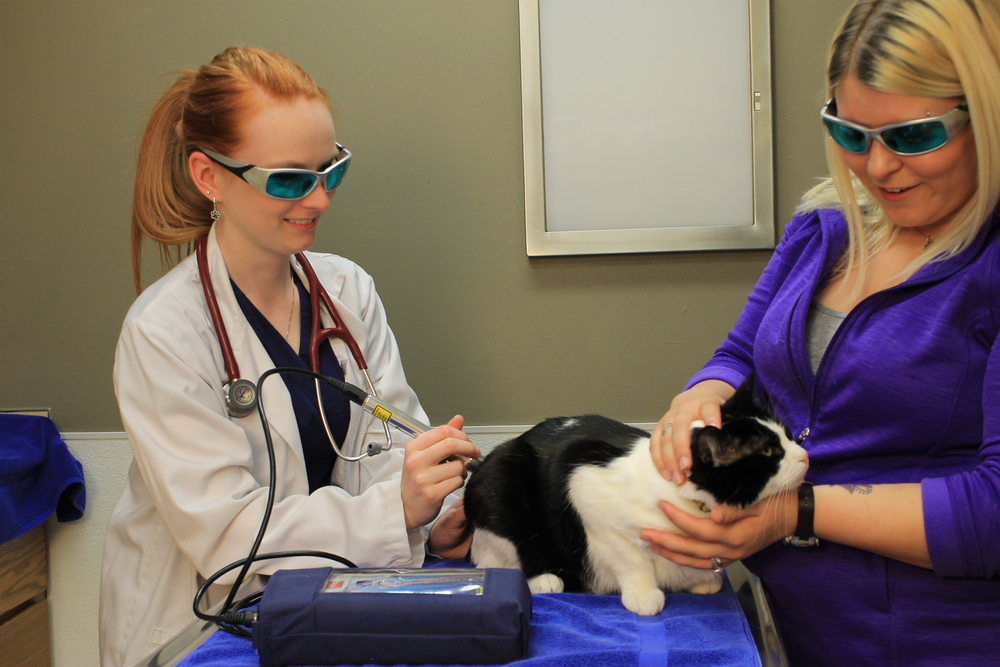Chiropractic care is one of many alternative therapies available for pets with certain health concerns and is often used alongside traditional medicine practices, massage, acupuncture, Chinese medicines and herbs, homeopathy, among other complementary therapies. Chiropractic care is an increasingly popular treatment modality with pet parents seeking holistic alternatives for their furry family members.
First, see your veterinarian
It is wise to ask your veterinarian to examine and diagnose your pet before pursuing chiropractic care, since some conditions may not be appropriate for this type of therapy. Depending on your pet’s condition, your veterinarian may recommend blood work, X-rays, ultrasound, or other diagnostics. Then, if chiropractic care is recommended for your pet, your veterinarian can help guide you to a properly credentialed veterinary chiropractor. Fortunately, this service is available for our clients and their pets at the Animal Clinic of Council Bluffs.
Only certified practitioners can perform chiropractic care on pets
Licensed veterinarians and human chiropractic doctors can become eligible to give pets chiropractic therapy. They must undergo a training program approved by the Animal Chiropractic Certification Committee (ACCC) that typically requires more than 200 study hours, and successfully complete written and practical examinations. Once certified, chiropractic practitioners must fulfill continuing education requirements to keep their credentials up-to-date. These requirements may vary by state.
Chiropractic care is generally safe
This practice involves moving joints along the spine and appendages to relieve tension and pain caused by small subluxations. When performed correctly, there is little risk to the patient and side effects, which included lethargy or temporary soreness that usually wanes with recurrent treatments, are minimal. However, if the adjustments are too forceful, or at an improper angle, serious damage can occur. Ensuring that a certified chiropractic professional treats your pet will minimize these risks.
Chiropractic care can address many problems in pets
While most chiropractic pet patients deal with diseases such as intervertebral disc disease, hip dysplasia, or chronic pain, pets with nerve, immune, or other problems can also benefit from this modality. For instance, chiropractic adjustments may help pets with fecal or urinary incontinence regain control of these functions, and may benefit pets with separation anxiety, certain skin conditions such as lick granulomas, or sleeping problems. Ask our veterinary team if chiropractic care is right for your pet’s condition—you may be surprised!
Most pets don’t find chiropractic care painful
The small joint adjustments are meant to relieve, rather than cause, pain, and most pets show no resistance to chiropractic treatment. However, if your pet is particularly painful or receiving her first treatment, there may be some hesitation. Usually, this fades as your pet returns for repeat treatments and begins to feel better.
Chiropractic care should not be the sole therapy

Chiropractic care is a great treatment option for many pets, but it works best when combined with other modalities for a more holistic approach. Depending on your pet’s condition, other treatments, such as acupuncture, massage, or laser therapy, may also help. Chiropractic care is meant as an adjunct therapy, not as a substitute for regular veterinary care, so always consult with your veterinarian to determine the best plan for your pet’s individual needs.
For more information on chiropractic care, how it works, and what you can expect during your pet’s treatment session, click here. Contact us if you would like to set up a consultation.






Leave A Comment